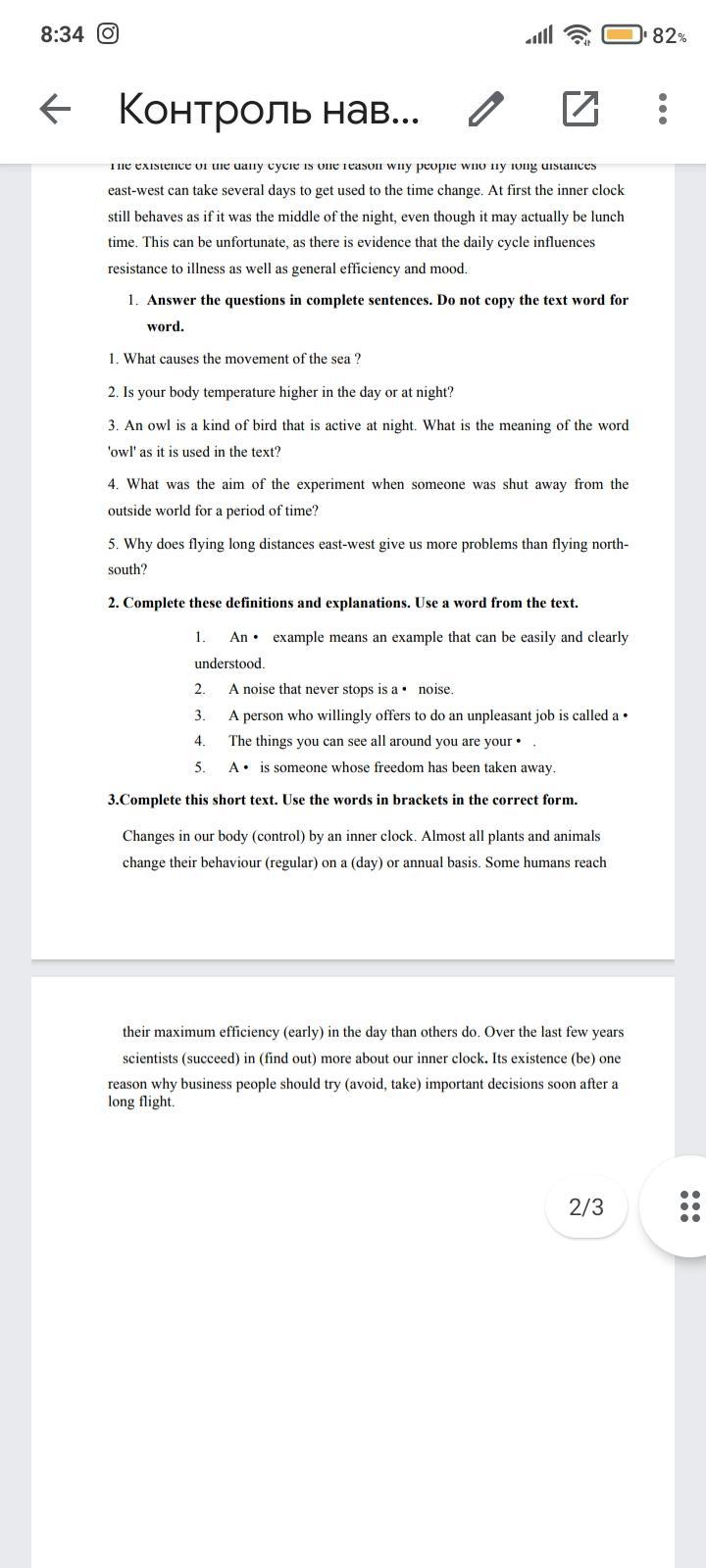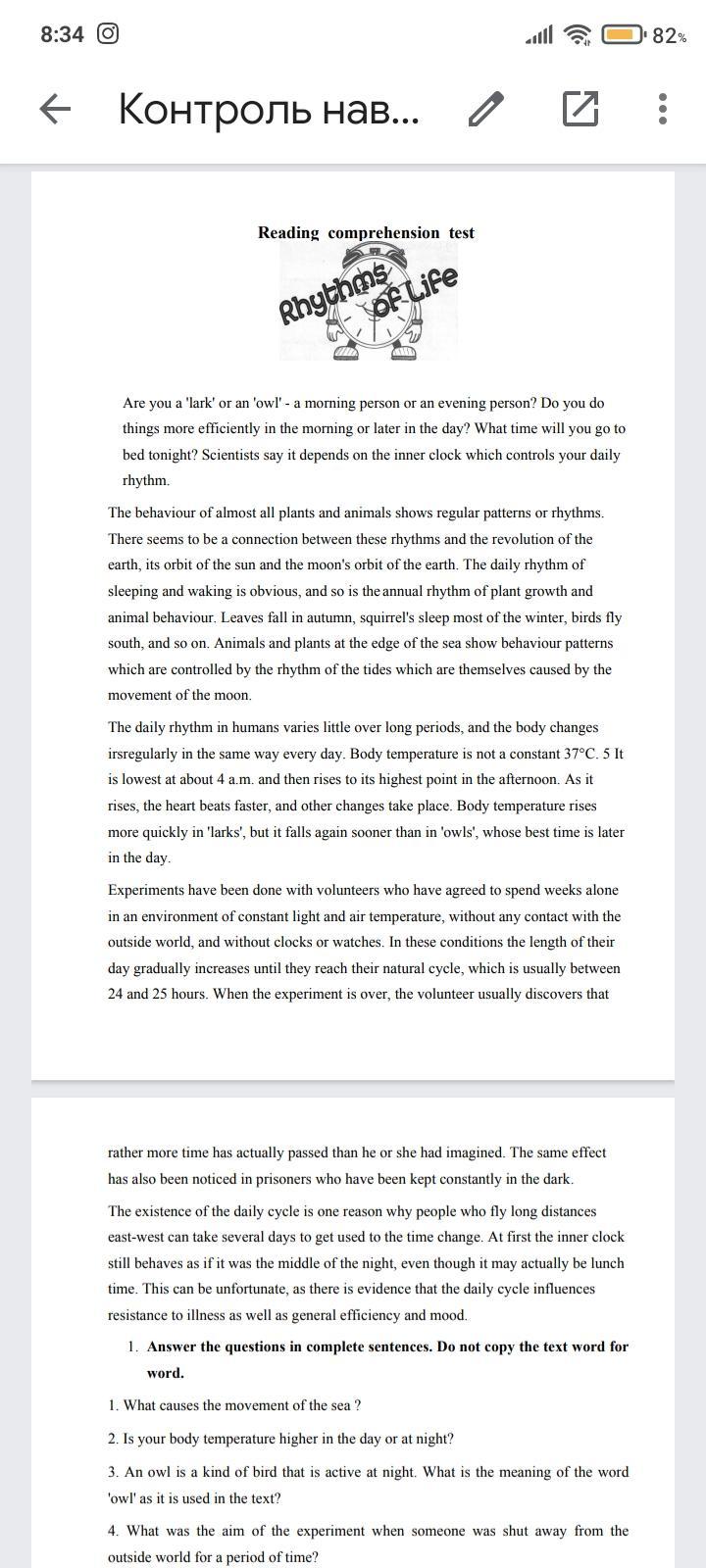СРОЧНО!!! 100 БАЛІВ ЗА ЗАВДАННЯ ПО АНГЛІЙСЬКІЙ МОВІ!!!
Are you a 'lark' or an 'owl' - a morning person or an evening person? Do you do
things more efficiently in the morning or later in the day? What time will you go to
bed tonight? Scientists say it depends on the inner clock which controls your daily
rhythm.
The behaviour of almost all plants and animals shows regular patterns or rhythms.
There seems to be a connection between these rhythms and the revolution of the
earth, its orbit of the sun and the moon's orbit of the earth. The daily rhythm of
sleeping and waking is obvious, and so is the annual rhythm of plant growth and
animal behaviour. Leaves fall in autumn, squirrel's sleep most of the winter, birds fly
south, and so on. Animals and plants at the edge of the sea show behaviour patterns
which are controlled by the rhythm of the tides which are themselves caused by the
movement of the moon.
The daily rhythm in humans varies little over long periods, and the body changes
irsregularly in the same way every day. Body temperature is not a constant 37°C. 5 It
is lowest at about 4 a.m. and then rises to its highest point in the afternoon. As it rises,
the heart beats faster, and other changes take place. Body temperature rises more
quickly in 'larks', but it falls again sooner than in 'owls', whose best time is later in the
day.
Experiments have been done with volunteers who have agreed to spend weeks alone
in an environment of constant light and air temperature, without any contact with the
outside world, and without clocks or watches. In these conditions the length of their
day gradually increases until they reach their natural cycle, which is usually between
24 and 25 hours. When the experiment is over, the volunteer usually discovers thatrather more time has actually passed than he or she had imagined. The same effect
has also been noticed in prisoners who have been kept constantly in the dark.
The existence of the daily cycle is one reason why people who fly long distances
east-west can take several days to get used to the time change. At first the inner clock
still behaves as if it was the middle of the night, even though it may actually be lunch
time. This can be unfortunate, as there is evidence that the daily cycle influences
resistance to illness as well as general efficiency and mood.
1. Answer the questions in complete sentences. Do not copy the text word for
word.
1. What causes the movement of the sea ?
2. Is your body temperature higher in the day or at night?
3. An owl is a kind of bird that is active at night. What is the meaning of the word
'owl' as it is used in the text?
4. What was the aim of the experiment when someone was shut away from the
outside world for a period of time?
5. Why does flying long distances east-west give us more problems than flying
north-south?
2. Complete these definitions and explanations. Use a word from the text.
1. An • example means an example that can be easily and clearly
understood.
2. A noise that never stops is a • noise.
3. A person who willingly offers to do an unpleasant job is called a
•
4. The things you can see all around you are your • .
5. A • is someone whose freedom has been taken away.
3.Complete this short text. Use the words in brackets in the correct form.
Changes in our body (control) by an inner clock. Almost all plants and animals
change their behaviour (regular) on a (day) or annual basis. Some humans reachtheir maximum efficiency (early) in the day than others do. Оver the last few years
scientists (succeed) in (find out) more about our inner clock. Its existence (be) one
reason why business people should try (avoid, take) important decisions soon after a
long flight.


Ответы
1) 1. What causes the movement of the sea?
The movement of the sea is caused by the rhythm of the tides, which are themselves caused by the movement of the moon.
2. Is your body temperature higher in the day or at night?
Body temperature is highest in the afternoon and lowest at about 4 a.m.
3. An owl is a kind of bird that is active at night. What is the meaning of the word 'owl' as it is used in the text?
The word 'owl' in the text refers to a person who is more active and efficient later in the day.
4. What was the aim of the experiment when someone was shut away from the outside world for a period of time?
The aim of the experiment was to determine the natural cycle of a person, which is usually between 24 and 25 hours.
5. Why does flying long distances east-west give us more problems than flying north-south?
Flying long distances east-west gives us more problems than flying north-south because it causes a change in the daily cycle, which can take several days to adjust to.
2) 1. An example means an example that can be easily and clearly understood.
2. A noise that never stops is a constant noise.
3. A person who willingly offers to do an unpleasant job is called a volunteer.
4. The things you can see all around you are your surroundings.
5. A prisoner is someone whose freedom has been taken away.
5) Changes in our body are controlled by an inner clock. Almost all plants and animals change their behaviour regularly on a daily or annual basis. Some humans reach their maximum efficiency earlier in the day than others do. Over the last few years, scientists have succeeded in finding out more about our inner clock. Its existence is one reason why business people should try to avoid taking important decisions soon after a long flight.